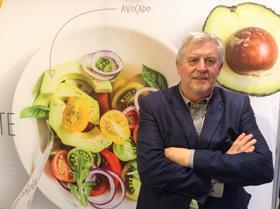
The role of a fresh produce company is shifting away from being a supplier of ingredients to becoming part of a food culture, one leading industry figure has said.
To reflect today’s consumption habits and match consumer demand, suppliers must understand how young people rely on visual inspiration for food, rather than building a meal out of available food, according to Nic Jooste, director of Dutch supplier Cool Fresh International.
“My inspiration from that comes from my teenage children, how they choose to eat is fundamentally different from the generation before,” he said. “My children are on their phone 24/7, they see a picture and they want to eat it, regardless of whether it’s in the fridge.
“I see the role of the fresh produce company changing significantly from being a supplier of ingredients to being part of a food culture.”
Jooste said Cool Fresh, which was exhibiting at last week’s Amsterdam Produce Show, is looking at diversifying into “the new economies”, such as online and home delivery.
“We’re changing our own focus in terms of who we are,” he said. “In all probability, rather than diversify, we will have a narrow portfolio and go deeper into certain products. For example, on pineapples, we might invest in packaging, branding and add-ons.
“We used to be an importer of 50 products, but we’re changing the way we think. If you can’t add value, you’re just forwarding produce as a wholesaler.
“We’ve got a good reputation in products such as grapes, citrus, pineapple, ginger, garlic, stonefruit and avocado. But in pomegranate, for example, we need to ask, is this something we want to be in?”
Almost two third of the Cool Fresh business is in the retail sector, said Jooste, primarily in eastern and central Europe where there is still an opportunity to add value and improve operations. “There is still a two to three year window in which we can improve how we operate there,” he said.
“Parallel to that is analysing the new economies and talking to possible partners. What I think we will see is continued growth in new trends such as vegetarian cooking, local sourcing, in Holland there are lots of developments in these areas.”
One trend that Jooste said could shape future food supply in the Netherlands is the role of the national postal service, which he said is deeply involved in the sector.
“They have an idea that is close to being realised about having a distribution centre and working directly with suppliers, so the consumer is buying direct from the manufacturer but ordering direct through the postal service,” he said.
“If we ignore that trend, someone else will get there before us. If we want to remain relevant, we have to be at the forefront with our messaging and the latest concepts.”



